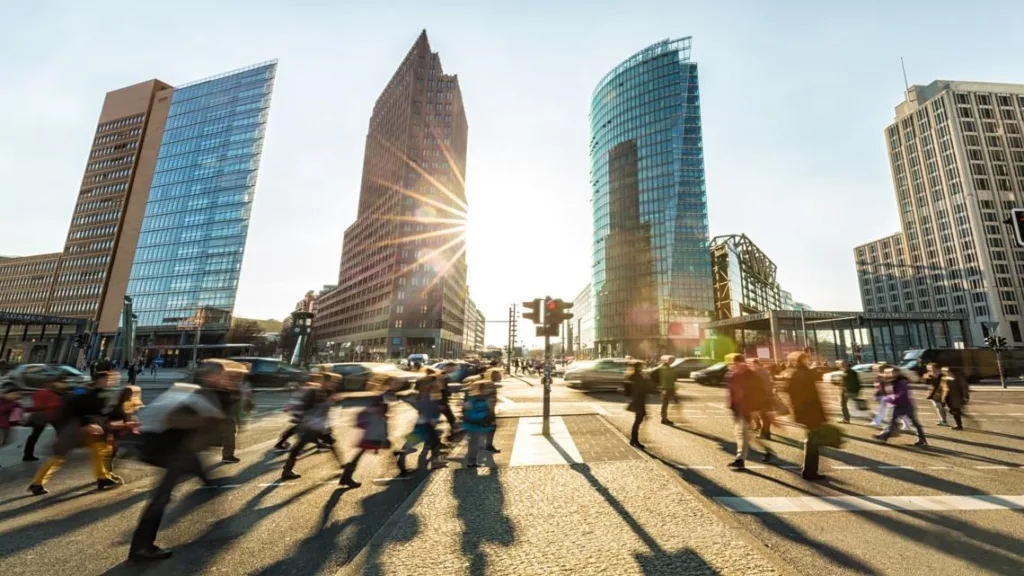After a year-long project phase, the World Business Council for Sustainable Development (WBCSD) has issued recommendations for cleaner, safer and more connected mobility in the Free and Hanseatic City of Hamburg.
Hamburg, Geneva, Stuttgart, 29 March 2016 – The guidance, prepared in collaboration with the Department of Economy, Transport and Innovation, intends to fuel the political debate on promoting sustainable mobility in Hamburg.
The recommendations include that, as part of its transport development planning, the city could benefit most from optimizing its existing transport and mobility system, providing benefits to users of sustainable transport and setting clear political targets for greater sustainability.
Some of the specific measures recommended by WBCSD include carrying out pilot projects to reduce freight traffic load at peak times and testing a dynamic model for parking charges with benefits for vehicles with alternative drive systems. The city must also continue to strengthen initiatives such as MobilProfit or the air quality partnership to support businesses in the implementation of company mobility management concepts.
It is also recommended that the city promotes a closer connection of transport modes by offering integrated, multimodal mobility apps. WBCSD is supporting Hamburg city authorities in their plans to extend the bus system. This extension requires swift and systematic implementation supplemented by additional measures to raise travel speed and capacity and improve the environmental profile of the bus as a carrier.
The recommendations are the outcome of WBCSD’s Sustainable Mobility Project (SMP 2.0) in Hamburg, which has been carried out under the leadership of Daimler, with participation of BMW, Brisa, Deutsche Bahn, Ford, Fujitsu, Toyota and Volkswagen. Findings for the city of Hamburg are summarized in a final report presented to Andreas Rieckhof, State Councilor for Economy, Transport and Innovation.
Andreas Rieckhof, said: “Collaboration with the World Business Council and its member companies has been beneficial for Hamburg. The results of the project validate our transport policy and measures such as bus optimization or bicycle traffic strategy. But, they are also a call to the city to focus even more intensively on the sustainability of our transport system. We intend to incorporate these suggestions in the ongoing process of transport development planning.”
Klaus Entenmann, Chairman of the Management Board of Daimler Financial Services AG responsible for mobility services within the Daimler group, said: “The recommendations put forward by WBCSD highlight the strengths of Hamburg, and the areas of action that should be addressed by the city authorities. With this project, the participating companies have demonstrated that they cannot only offer environmentally compatible vehicles and innovative mobility concepts to support sustainable mobility, but they can take a collaborative, holistic approach to support cities like Hamburg in setting and achieving their goals in relation to improving sustainable mobility.”
Collaboration with Hamburg is part of WBCSD’s Sustainable Mobility Project (SMP 2.0), which aims to spread state-of-the-art technologies and transport concepts, to improve mobility in cities worldwide. The ultimate goal of SMP2.0 is to accelerate and extend access to safe, reliable and comfortable mobility for all, whilst aiming for affordability, zero traffic accidents, low environmental impacts, and reduced demands on energy and time.
In 2013, the WBCSD categorized global cities into six clusters according to their mobility characteristics and nominated six cities as pilots to develop a roadmap for sustainable mobility together with city governments and related stakeholders. Hamburg was chosen along with Lisbon (Portugal), Campinas (Brazil), Chengdu (China), Indore (India), and Bangkok (Thailand).
Related
Content

A global view for transport and sustainable mobility
17 May, 2023

Global coalition releases policy framework to enable data sharing for sustainable mobility
9 March, 2021

Accelerate sustainable mobility in your city: the Corporate Mobility Pact (CMP) initiative
1 July, 2020

